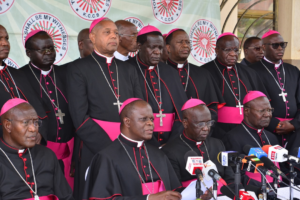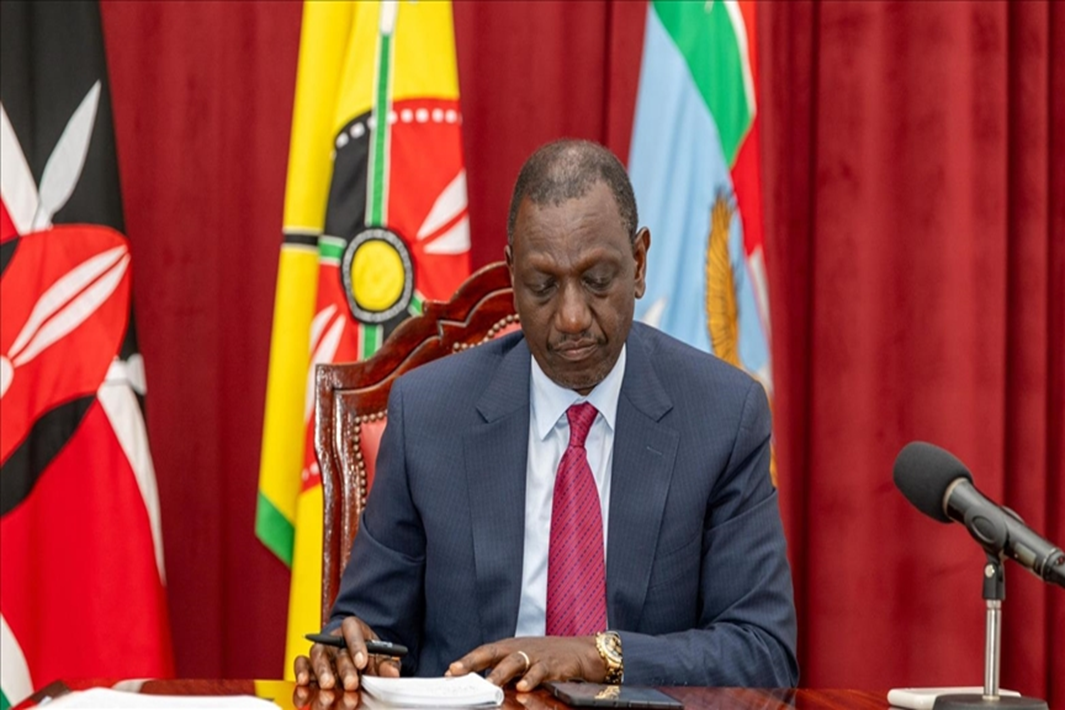By Paschal Norbert
NAIROBI, NOVEMBER 15, 2024 (CISA) – On a day when the Kenya Catholic Bishops chose to speak truth to power and delivered a powerful critique of President William Ruto’s government, accusing it of perpetuating lies, using state machinery to suppress dissent, and failing to address the suffering of ordinary Kenyans. The administration responded with a flurry of defensive statements, but the bishops insisted that the government’s actions were eroding democratic gains.

During their plenary meeting on November 14, held at the Catholic Archdiocese of Nairobi Clergy Home, the bishops, led by Most Rev Maurice Muhatia Makumba of Kisumu, Chairperson of the Kenya Conference of Catholic Bishops (KCCB), condemned the government’s failure to uphold its campaign promises. They decried the administration’s disregard for the cries of struggling citizens and accused it of fostering a culture of dishonesty.
“The culture of lies is swiftly replacing the integrity and respect that Kenyans deserve. Basically, it seems that truth does not exist, and if it does, it is only what the Government says. Unfortunately, it seems that the Kenyans have helplessly tolerated the lies told to them constantly by the politicians. Kenyans must learn not to applaud or validate the lies that the politicians tell them, but rather must resolve to seek and be led by the truth,” stated the bishops.
The bishops’ statement, which criticized Kenya Kwanza’s economic policies and governance, rattled the administration. Key government figures, notably Senate Majority Leader Aaron Cheruiyot and MP Oscar Sudi, close allies of President Ruto, rushed to defend the regime on social media and in press statements. While acknowledging the concerns raised, they simultaneously accused the bishops of exaggerating issues.
“It is unfortunate that religious leaders are resorting to sweeping generalizations. If they have issues with specific leaders, they should seek redress through constitutional channels rather than condemning the entire legislature,” Cheruiyot argued.
The Senate Majority Leader Cheruiyot hit back at the Catholic bishops’ criticism, accusing the clergy of spreading “propaganda and falsehoods.” He specifically challenged their claims regarding legislative actions, particularly the bishops’ assertions that critical bills, such as the proposed constitutional amendment, are being rushed through Parliament without sufficient debate.
Cheruiyot, in a statement, dismissed the bishops’ concerns and pointedly noted that the contentious constitutional amendment bill was introduced by Senator Samson Cherargei of Nandi County, who he emphasized is “a devout Catholic faithful.”
He further clarified, “For the record, this was a privately sponsored bill. The Majority Party UDA distanced itself from the proposal and advised its members not to support it. Moreover, the bill was overwhelmingly rejected during public participation sessions conducted by the Senate.”
The bishops had also criticized the implementation of the Social Health Insurance (SHI) Act, 2023, which they argued has replaced the National Health Insurance Fund (NHIF) with the new Social Health Authority (SHA), leaving Kenyans struggling to access affordable healthcare.
The bishops also highlighted the government’s failure to pay outstanding debts to Catholic and Protestant healthcare facilities under the now defunct National Health Insurance Fund (NHIF), which they claim are owed approximately KSh 3 billion. This debt, they say, threatens the provision of affordable healthcare, particularly for underserved communities.
For months, the bishops have urged the government, including in meetings with President Ruto, to release the funds to mission hospitals.
“When the Government fails to fulfil its promises, particularly concerning payments to essential service providers, it harms vulnerable communities. This is the case with NHIF. The neglect of Faith-Based Organizations (FBO) hospitals, now owed billions in dues, is an issue we have addressed constantly even with the President,” the bishops emphasized, noting that faith-based hospitals are on the brink of collapse.
This concern was partially confirmed by Health Cabinet Secretary Deborah Barasa, who acknowledged that as of October 2024, the defunct NHIF owed KSh 19 billion. She noted that the government has mobilized KSh 7.58 billion, with KSh 5 billion already disbursed to healthcare providers, including KSh 938 million to Catholic-run facilities, and promised the remaining KSh 2.5 billion will be released next week.
However, the SHA has been marred by public dissatisfaction, with many Kenyans reportedly paying out-of-pocket for medical services despite mandatory SHA contributions. The situation has worsened with the dismissal of SHA’s acting CEO, Dr Elijah Wachira, and the resignation of board member Dr Zakayo Kariuki Gichuki, raising concerns about the scheme’s stability.
The bishops also criticized the government’s handling of other pressing issues, such as excessive taxation, escalating costs of missionary work permits, youth unemployment, and unaddressed educational reforms like the Competency-Based Curriculum (CBC). They further highlighted the government’s failure to appoint commissioners to the Independent Electoral and Boundaries Commission (IEBC).
In perhaps their strongest statement to date, the bishops stood with the people, echoing widespread frustrations over corruption, human rights abuses, and misplaced priorities under President Ruto’s administration. Their bold stance has struck a chord with many Kenyans who feel abandoned by a government that promised change but has yet to deliver.
